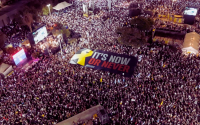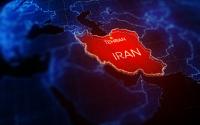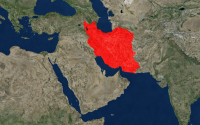Guardian, Monday September 17, 2001
This is a dangerous moment in history. It would be foolish to allow differences about the best way to respond to a terrorist threat to degenerate into an ideological contest that can only make wise choices more difficult, and perhaps fragment popular support for the decisions our governments make.
Unhappily, there are some signs of old reflexes jerking in Britain and in other countries. There is the right's familiar attack on a left that supposedly sees the problem only in terms of western, and particularly American, responsibility for everything that goes wrong in the world. There is the left's familiar attack on a right that supposedly admits no responsibility at all, and thinks only of imposing solutions by force of arms.
This is cardboard stuff. If we in Britain let ourselves talk this up, we could recreate the polarisation of the Suez crisis, but without the genuinely principled differences that accompaniedit. That would not be of much use to us, or to the US.
Suez illustrates the danger of letting discussion be drawn into the vortex of the appeasement row, whether the appeasement is of Nazi Germany, the Soviet Union, or, now, of terrorists. The truth is that both right and left have actions in the historical record of which they should be ashamed. Unfortunately, nobody has a monopoly on appeasement. And it is also true that, for a long time, there has been a divide in western societies between those who see opponents mainly as enemies and those who tend to see, and even sometimes endorse, their opponent's point of view. The debate over what the Australians call the "black arm-band view" of history, a debate over power, oppression and guilt, is old, continuing, and important.
And it has expanded in recent years to encompass the question of whether those now rebelling against what is still largely a western ordering of global affairs are justified in their ends, and even perhaps sometimes in their means. What this debate reveals is that the coarser and simpler the approach - whether it comes from the right or the left - the more it misses reality.
Michael Gove of the Times has singled out the Guardian for special censure in an article professing to identify a dominant radical chic tendency on the left, a tendency that he feels has always romanticised rebel violence, that is persistently anti-American and anti-Zionist, and that is now, he implies, almost pro-terrorist.
If this were a normal time, it would be a normal knockabout, but this is not a normal time. Of course, there is a silly, and sometimes morally irresponsible, element on the left. This element has been opposed most effectively, and usually by others on the same political side. But to pretend that this element is the whole picture, as Gove does, is itself irresponsible. In a more thoughtful piece in the Sunday Telegraph yesterday, Anne Applebaum explored what she sees as a worrying potential axis between the British anti-American left, an anti-American section of the isolationist British right, and British Muslims.
She rightly detects a shift from the phase of pure sympathy after the attacks. In this second phase, the question of whether the US had contributed in some way to what happened began to be raised, and fears emerged that retaliation would be ill-judged or excessive. But surely these are legitimate concerns, and they do not diminish the genuine grief that people all over the world, wherever they stand politically, feel about America's loss.
Nor are these concerns absent from American minds. They are properly seen as questions needing answers, because those answers will help us make sure that something like this does not happen again. The pathological human zone which exists today in Afghanistan and parts of Pakistan was created by war, social breakdown, and the degeneration of religious tradition. Many contributed toward it, including the Afghans, as did the occupying Russians.
But when the US, Pakistan, and Saudi Arabia, with help from the British and others, joined together 25 years ago to make life difficult for the Soviets, funding and arming the Afghan rebels and the international Muslim army that fought alongside the rebels, they thought little of the trouble they were storing up for themselves. After the Russians pulled out, the US and other western countries turned their backs on the mess that was post-Soviet Afghanistan. "What was more important in the world view of history? The Taliban or the fall of the Soviet Empire? A few stirred-up Muslims or the liberation of Central Europe and the end of the cold war?" wrote Zbigniew Brzezinski. In retrospect that seems amazingly insouciant.
At least in principle, the need for careful judgment on a military response surely ought not to be subject to dispute across the left-right divide. This is a matter of prudence, and of measuring the situation in the Muslim world. Ahmed Rashid, in his book on the Taliban, entitles his chapter on the Taliban's religious approach "Challenging Islam". The Taliban, culturally stripped bare by a generation of war and displacement, have completely lost touch with the diverse and tolerant Islamic heritage of pre-war Afghanistan. They have given shelter to dissidents from some Arab societies who, for other reasons, also follow a distorted form of Islam. It is possible, but very far from proven, that Saddam Hussein may have funded or used them.
In the light of this, the question is whether, as Anne Applebaum thinks, the Muslim world is rotten with terrorism, the extirpation of which may take years. Or whether there is a major problem area, recognised by Muslim as well as western societies, with which we and they have to deal. Or is the truth somewhere in between? That there is a major problem area - Afghanistan and Pakistan - to which we must add many Muslim societies in an uneasy balance (not helped by the Palestinian situation), in which new forms of Islam compete for allegiance, but in which religious and political leadership mostly manage to maintain a complex and relatively humane tradition.
What needs to be considered is how particular military actions will affect, not only those under immediate attack, but those societies in that more general balance. This is not being soft on terrorism, nor is it ruling out the use of military force. It is certainly not being anti-American. It is simply expressing the hope that this time we - Americans and all the rest of us on this complicated planet - will get it right. Getting things right involves discussion, criticism, consultation. Even then there is no guarantee. But we have a better chance of success if we maintain a calmness of temper and try not to let old quarrels dominate a new situation.






